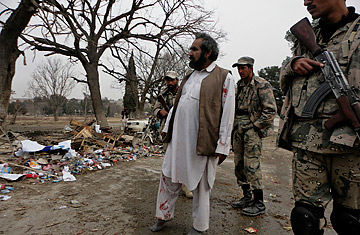
A wounded man, left, looks at the site of a suicide bombing that killed nine people, including one police officer, and injured 40 others in Khost, Afghanistan, on Feb. 18, 2011. The incident was the latest to target Afghan police, who, along with the country's army, are due to take control of the nation from international troops by 2014
It was carnage. There was a momentary crackle of gunfire and then, as a powerful car bomb detonated in Khost, a city in southeastern Afghanistan, a shock wave splintered trees and scattered body parts across 50 m of parkland and marketplace. Rags from what looked like children's clothes lay caught on the twisted metal of an axle; nearby, shops' windows were blown in, and the dirt road was slicked with blood. The iron strut supporting a giant billboard was bent like a paper clip.
Officials say nine people died and more than 30 were wounded in the Feb. 18 suicide bombing, although the toll rose over the course of the day and could still increase, with at least four survivors in critical condition. Among the casualties were women, children and two policemen, according to the public-health director for the province. It was a reminder that although spectacular attacks in Kabul, the capital, garner lots of airtime and column inches, most of Afghanistan's violence takes place in the provinces, where murderous atrocities can go unreported and don't attract attention in the way an attack against Westerners does.
As violence in Afghanistan worsens, it is the country's villagers and the residents of provincial towns like Khost — and Kandahar in the south — who are paying the biggest price. The U.N. reckons that civilian casualties are at a 10-year high, with 2,412 killed and 3,803 wounded in the first 10 months of last year alone. In most cases, insurgents are to blame.
Khost's hospital wards were jammed with patients Friday afternoon. From his bed, a taxi driver named Naquibullah said he had pulled over to let a red SUV pass, only for it to accelerate toward a police checkpoint as officers tried to wave it down. "He was driving very quickly," Naquibullah said. "The police ordered him to stop, but he didn't, so they opened fire. There was a huge explosion, and I don't know what happened. My windshield was gone. My head was badly injured." It was still bleeding as he spoke.
The attacks generated enormous anger. Alef Khan, a bicycle repairman whose shop was damaged in the blast, said he'd lost his whole business and "had nothing to feed my family." Another survivor condemned "this cruel attack." These feelings are hardly unique, and the Taliban supreme council has ordered followers to refrain from hurting innocents. On Friday, a spokesman swiftly issued a statement claiming that the Khost attack had taken the lives of 13 policemen, wounded 14 others and taken out four police pickups — pointedly ignoring the civilian collateral damage in the hospital wards. Why do the insurgents persevere with tactics that rarely dent their opponents, even when they know it exacts a heavy civilian toll? And why doesn't NATO seem to profit from this?
Several analysts and officials argue that the politicization of Afghanistan's clerics — a trend that began in the 1970s and continues now — is partly to blame. Preachers in rural areas, where government presence is slight or nonexistent and the only available education takes place in madrasahs, can carry great authority, especially with the erosion of traditional tribal leadership. Unpopular NATO tactics like night raids have prompted some imams to actively encourage members of their flock to engage in jihad. "The maulvis and the mullahs are political now," an Afghan official says. "They're telling people, 'If you kill someone, you'll go to paradise.' So these guys end up just looking for targets."
At the same time, the Taliban is less likely to rouse the strong emotions NATO does when it kills people. "It's speculation, but I think there is a difference, because U.S. and other international forces are outsiders," says Martine van Bijlert, a director with the Afghanistan Analysts Network, a Kabul-based think tank. "It is a feeling that has grown stronger over the years. And there is this increased propaganda that they've come here to harm [Afghans]. Obviously you'd expect outrage if a lot of people get killed, but with the international forces, it's increasingly becoming a symbol of intrusion that you don't have in the same way with the Taliban. Patience is wearing thin with NATO. Even with those who support their presence here."
